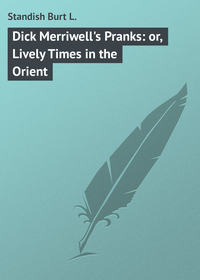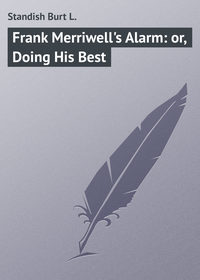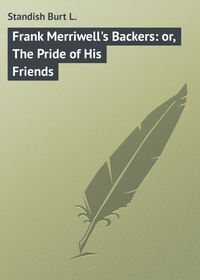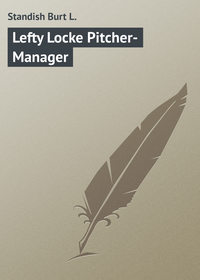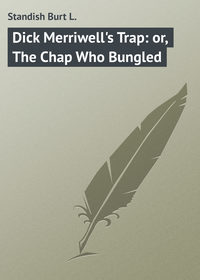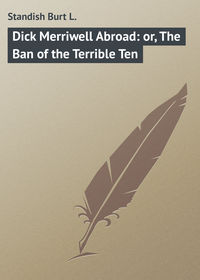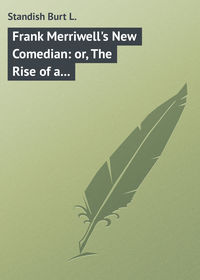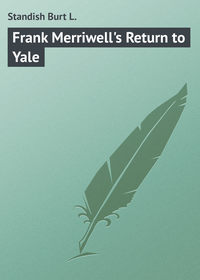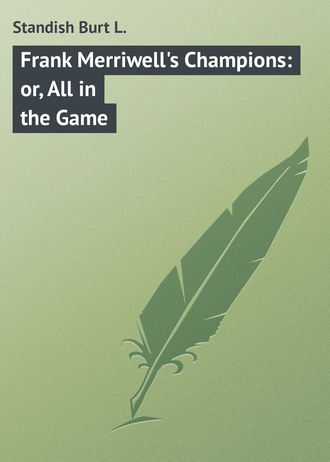 полная версия
полная версияFrank Merriwell's Champions: or, All in the Game
“In the red – seven.”
“Good for you!” cried Diamond. “That’s two better than I did.”
“Somebody’s got to hustle ef they beat us this day, an’ don’t yeou fergit it,” said Gallup, that queer grin still on his face.
Ward Hammond faced the target with a confident air. He was a good shot with the bow, and was well aware of the fact.
“In the gold – nine!” cried the marker, as Hammond’s arrow struck, and then the Blue Mountain boys sent up a cheer.
Merriwell followed, and let slip the arrow with a steady hand.
“In the gold – nine!” cried the marker, again, almost before Hammond’s friends had ceased their cheering, and then it was the turn of Merriwell’s followers.
Toots would not shoot, excusing himself by saying he knew he would kill somebody if he did, and when Dunnerwust came again to the scratch there was a cautious widening of the semicircle gathered about the archers.
Hans came near shooting himself, this time, for the arrow slipped, while he was trying to fit it to the string, and flew skyward, past his nose.
“Look oudt!” Hans squawked. “Uf dot comes down your head on, I vill ged hurt!”
It fell near Gallup, who stepped nimbly to one side as it descended.
“Look here, b’jee!” he growled. “If you’ve got a grutch agin’ me, say so, but don’t go shootin’ arrers at me zif you was an’ Injun an’ me a Pilgrum Father.”
“Oxcuse me!” supplicated the Dutch boy. “Dot string slipped der arrow py ven I dry to fix him. Shust eferypoty stant avay off, now, so I vill nod ged hurted.”
The semicircle widened this time to a very respectable distance. Hans spat on his hands, grasped the plush handle in the middle of the bow, fitted the arrow and drew it down with exceeding care. When he had sighted with his open right eye till every one was growing impatient, he let the bowstring slip.
“In the white – one!” shouted the marker.
In all his practice Hans had never before struck an arrow in the target, and he was so pleased now that he fairly hugged himself with delight.
“Vot vos id you tolt me?” he cried, in great elation. “We peen goin’ to vin dis game so easy as falling a log off!”
“Yes, it’s won!” said Hammond, with a perceptible sneer. “There is no doubt, Dutchy, that you’re a shooter from Shootville. If you hit the white again, it will count two.”
“You pet yourselluf der v’ite vill hid me so many as sixdeen dimes alretty!” cried Hans, stung by the sneer.
Hammond struck the gold again, but Merriwell got only the red. Twice this was repeated; after which Merriwell put his arrow in the gold three times in succession, while Hammond dropped to the red, and once to the blue, which last counted only five.
It quickly developed that there were good archers on both sides, and the contest waxed hot. Diamond, Rattleton and Gallup shot well, as did also Colson and Tetlow. Six times the yellow-haired, big-jointed boy from Vermont put his arrow in the gold, though he faced the target so awkwardly that it did not seem possible he could handle a bow at all.
As for Browning, he had been left at the camp, muffled up in a blanket and in the grip of another chill.
“I didn’t learn to knock the sparrers out o’ dad’s old barn with a bow an’ arrer fer nuthin’!” Gallup grinned, when some one praised his marksmanship.
In addition to Ward Hammond, Craig Carter, of the Blue Mountain boys, shot excellently, as did also Dan Matlock and some half dozen others.
The contest grew hotter and hotter. The club scores – the average scores of the combined membership of each club – ran very evenly, and as the shoot drew toward its close, the count of the club scores showed five in favor of the boys of Lake Lily, with Ward Hammond’s score three more than Merriwell’s, and the best that had been made.
“Don’t l’ave him bate yez, Merry, me b’y!” Barney Mulloy whispered.
“You may be sure I’ll do my best, Barney,” responded Merriwell, compressing his lips as he stepped again to the line and took up the bow.
“Seven – in the red!” cried the marker.
Then, as Ward Hammond followed:
“Nine – in the gold!”
There were only three more rounds, twenty-one of the twenty-four rounds of the contest having been shot.
“Here are the leading scores, as revised after that last shoot,” announced the youth who kept the score card, reading from the card, while the excited and anxious lads gathered closely about him. “Ward Hammond, 145; Frank Merriwell, 140.”
The Blue Mountain boys swung their caps and sent up a cheer of delight.
Again Frank faced the target and let his arrow fly.
“Nine – in the gold!” came the voice of the marker.
“Good boy!” cried Harry Rattleton. “That gives you one hundred and forty-nine. Do it another time.”
Frank Merriwell did it another time; and when the marker called “nine,” Ward Hammond became noticeably rattled, for he had made only seven in the previous shot.
Hammond’s hands were seen to shake as he drew on the bowstring, and when the marker called, “only five – in the blue,” his dark face grew almost colorless.
“One more round,” said the score marker. “Frank Merriwell now has 158; Ward Hammond, 157.”
The excitement was at fever pitch as Merriwell again went forward to shoot.
He knew that everything depended on this last shot. If he could again hit the gold, it would then be impossible for Hammond to beat him, for he already led Hammond by one and Hammond could do no more than strike the gold. Therefore he went about his preparations with the utmost coolness and care.
Grasping the bow in the middle with his left hand, he placed the notch of the feathered arrow on the middle of the string with his right, resting the shaft across the bow on the left side just above and touching his left hand. Then, with the first three fingers of his right hand, which were covered with leather tips to protect them, he grasped the string and the arrow-neck.
It was an inspiring sight just to look on Merriwell at this supreme moment, as he stood ready to shoot. He seemed to be unconscious that there was another person in the world. His body was gracefully erect, his left side slightly turned toward the target, his left arm rigidly extended, and his right hand drawing steadily on the string of the bow. There was a shining light in his eyes and on his face a slight flush.
The profound silence that had fallen on every one was broken by the twang of the bowstring, by the arrow’s whizzing flight and by the audible sighs that went up as it sped on its way.
“Nine – in the gold!” called the marker, with a thrill in his usually monotonous voice.
But there was no cheering, though Rattleton felt like cracking the blue dome of the sky and his throat as well. The excitement was too intense.
“I’ll duplicate that or break the bow!” Hammond was heard to mutter.
Merriwell walked down toward the target, anxious to observe the arrow as it struck, a proceeding that was perfectly allowable so long as he kept out of the archer’s way.
Diamond, who was watching Hammond, saw the latter’s face darken while the pupils of the boy’s eyes seemed to contract to the size of pin points.
“That fellow is a regular devil,” thought Diamond. “I must warn Frank to look out or he’ll be waylaid and shot by him some of these fine evenings.”
Hammond drew the arrow to the head with a steady hand, but, just as he released it, his foot slipped back on the grass and the arrow was sharply deviated from the line it should have taken to reach the target. Instead of flying toward the gold, it flew toward Merriwell.
“Look out!” screamed Diamond, jumping to his feet.
Merriwell had reached the narrow path that ran across the grounds and was directly in front of a tree that stood in the path and cut off the view toward the village.
He heard the “whir-r-r” of the arrow, heard Diamond’s cry, and dropped to the ground on his face.
At the same instant, the straight, lithe form of a girl of seventeen or eighteen appeared from behind the tree.
She was directly in the line of the arrow’s flight. She, too, heard the warning, but she did not understand it. She did not dream of peril.
Then the arrow struck her, and, uttering a cry, she staggered backward and went down in a heap.
CHAPTER IV – BRUCE BROWNING’S ADVENTURE
“Heavens, she is killed!” thought Frank, leaping up and running toward the fallen girl.
There were excited exclamations from the group of archers, and a sound of hurrying footsteps.
Frank saw the girl struggle into a sitting posture and pluck away the arrow, which seemed to have lodged in the upper part of her left arm or in her shoulder. Then she staggered to her feet. When he gained her side she was trembling violently, and her thin face was as white as the face of the dead.
Only a glance was needed to tell him that she was the daughter of one of the poor whites of the Blue Ridge Mountains. Her dress was of faded cotton, her shoes heavy and coarse. In one hand she clutched a calico sunbonnet, which had dropped from her head as she fell.
“You are hurt!” gasped Merriwell. “Will you not let me assist you in some way?”
She shivered and gave him a quick glance, then stared toward the lads who were rushing in that direction. The sight galvanized her into activity.
“I dunno ez I’ve any call ter be helped!” she asserted, starting back and giving a last look at the arrow, which lay on the grass at her feet, where she had flung it as if it were a snake. “Leastways, I ’low ez how I kin make my way home. I war a good ’eal more skeered than hurt.”
“But I saw the arrow strike you!” Merriwell persisted.
She put out her hands as if to keep him from coming nearer, then sprang back into the path, and vanished behind the tree and into the depths of the woods before he could do aught to prevent the movement.
“She’s gone,” said Frank, as the others came up on the run. “There’s the arrow. I saw her pluck it out of her arm or shoulder, but she would not stay to explain how badly she was hurt.”
“That is Bob Thornton’s girl, Nell,” said Hammond, in a shaky voice. “I hope she isn’t much hurt. That was an awkward slip I made, and if I had killed her I could never have forgiven myself.”
Merriwell gave him a quick and comprehensive glance. It was caught by Hammond, and served to increase his agitation.
“It was a very awkward slip, as you say, Mr. Hammond. That arrow might have killed me. It would certainly have struck me, if I hadn’t dropped as I did.”
“Accidents will happen, you know!” pleaded Hammond. “I hope you don’t think I would do such a thing on purpose. It was a slip, just as when Dunnerwust shot the arrow into your nigger’s cap.”
He was about to say more, but checked himself, in the fear that he was beginning to protest too much.
“Perhaps we’d better gollow the firl – I mean follow the girl,” suggested Rattleton. “She may have tumbled down again.”
He did not wait for an order, but sprang into the path that led behind the tree, and hurried along it, with a half dozen curious fellows at his heels.
It was soon evident that the girl had not stuck to the path, which would have taken her back toward the village, but had plunged into the woods, which in places was thick with undergrowth.
“It’s no use to follow her,” said Hammond, joining the searchers. “It is likely she will make a short cut for home, where her father probably is, and where she can have the wound dressed. That is, if she was really wounded, which I doubt, from her actions. Perhaps the arrow only struck in her clothing, and frightened her. When I picked it up and examined the point, I could see no blood on it.”
The archery contest was virtually ended, with Merriwell and the Lake Lily Club the winners, and no one was in a hurry to go back to the shooting ground. But it was universally conceded in a little while that no good could be done by trying to follow one who knew the wilderness paths as well as any deer that roamed them, for it would be impossible to overtake her as long as she did not want to be overtaken.
While the boys talked and speculated, Nell Thornton was hastening on through the laurel scrub, unmindful of the stabbing pain in her shoulder; and, at the same time, Bruce Browning, wrapped in a heavy coat and with a handkerchief knotted about his shivering neck, was advancing slowly and languidly up the path in the direction of the archery grounds.
“I’m afraid that confounded chill is coming back,” Bruce grumbled, pushing a vine out of his way, “and I suppose I was a fool for leaving the cottage. I wish I had taken that other path, even if it is farther around. The bushes are thick enough here to make a squirrel sick, trying to worm through them. Hello! What does that mean?”
Nell Thornton, who had struck into this path from the woods, came into view, and was seen to reel and lurch like a boat in a gale.
Browning stopped and stared.
Then he saw her reach out to steady herself by a sapling, and sink down in an unconscious heap.
“By Jove! she’s fainted!” he muttered, stirred by the sight. “She must be ill or hurt! I wonder who she is?”
He forgot his lazy lethargy, and scrambled up the path with a nimbleness that would have been surprising to his friends, and which took him to Nell Thornton’s side in a very few moments.
“Blood on her hand and running down her arm!” he declared, with a gasp of astonishment. “Here’s a mystery for you!”
Nell Thornton lay with eyes closed, motionless, and seemingly without life. To Bruce her condition appeared alarming. He lifted her head, then let it drop back, and stood up and looked dazedly about, wondering what he should do. He recollected that he had seen a small stream of water trickling over the rocks a short distance below.
“Just the thing!” he thought. “I’ll carry her down there!”
As if she were a feather weight, he lifted her in his strong arms, and started down the path, moving in a hurry, now that his anxiety was thoroughly aroused.
“If the boys should see me now,” he groaned, “I’d never hear the last of it. Luckily, they’ll not be apt to see me. No doubt they are whanging away with their bows up on top of the hill. I wonder how she got hurt? Could it have been – ”
He stopped, and stared into the thin, pallid face.
“Could she have been hit by a wild arrow that missed the target and flew off into the woods? Heavens! I hope not!”
Down the steep path, slipping, sliding, maintaining his footing with difficulty, went Bruce Browning, with Nell Thornton in his arms, until he came to the rivulet he had seen gurgling over the rocks. There he put her down, as tenderly as if she were a sleeping child, and sought to make her comfortable by rolling up his coat and tucking it under her head and shoulders.
This done, he scooped up some of the water in his cap and began to bathe her hands in it, and to sprinkle it in her face.
But Nell Thornton was so slow to return to consciousness that Bruce was about to rip up the sleeve of her dress to ascertain the nature of the wound from which the blood still trickled, when she stirred uneasily.
Thus encouraged, he renewed his efforts, and a little later had the pleasure of seeing her eyes flutter open.
She stared in a puzzled way up into his face, then tried to get on her feet.
“Let me help you,” Bruce begged, slipping an arm beneath her head.
“Whar – whar am I?” she demanded, putting up a hand protestingly.
“You are hurt, and you fell in the path up there, a little while ago,” Bruce explained. “I brought you down here by the brook.”
She looked at her hand, saw the blood, and made another effort to get on her feet.
She succeeded this time, standing panting and wild-eyed on the rocks.
“I’m not hurt ter speak on!” she asserted. “I ’low ez how I must hev got dizzy-like an’ fell, but I ain’t hurt ter speak on.”
She seemed about to start on down the path, but checked herself, with the feeling that perhaps something in the way of an acknowledgment was due this handsome stranger, and continued:
“I’m ’bleeged to you. ’Twas a acks’dent, the way it happened. I war behint the tree, an’ they didn’t see me tell I stepped out, an’ then the arrer war a-comin’, an’ it war too late to be holped.”
“Then one of the arrows struck you, as I feared!” growled Browning. “Do you think you are much hurt? Perhaps you had better make an examination. The wound seems to be bleeding pretty freely.”
She drew the sleeve down, as if to hide the telltale color.
“Plenty time fur that when I git home, which, ef I ever git thar, I’d better be humpin’ myself along, too!”
Again she moved as if to start down the path, but was checked by Browning’s words:
“You are in no condition to go alone, Miss – Miss – ”
“My name’s Nell Thornton,” she said, coloring slightly, “ef that is what you mean. But these hyar mounting people don’t waste no breath a-sayin’ of miss an’ mister.”
Still, Browning could see that she was pleased.
“Miss Thornton,” he said, holding the cap, from which the water still dripped, “permit me to introduce myself. My name is Bruce Browning, and I belong with Frank Merriwell’s party, which arrived in Glendale only the day before yesterday. We have become members of the Lake Lily Athletic Club since, and it may be that the arrow which struck you was shot by one of my friends, for they are taking part in the archery shoot up on the hill.”
It was a very long speech for Bruce Browning, as he himself realized, but it slipped off his tongue very easily, under the circumstances.
“So I more than ever feel that it is my duty to assist you,” he continued, “and to see that you reach home without further accident.”
“I dunno what dad’ll say ’bout that,” she observed, shyly. “He allus declar’s ez he ain’t got no use fur citified people, with thar store clo’es, an’ sich. So I reckon it’d be an uncommon good piece o’ hoss sense ef you’d track back up the hill.”
“No, I can’t leave you that way,” declared Browning, who, looking into her white face, saw that she was so weak she was again on the point of falling. “You are in no condition to go on alone, Miss Thornton. I can’t permit it.”
Then he squeezed the water out of his cap, got himself into his coat, and prepared to assist her down the hill and to her home.
Bob Thornton’s cabin, the home of Nell Thornton, did not differ materially in its general aspect from other cabins Bruce Browning had seen in the mountains, except that it was larger. A bar of light from the descending sun fell through a wooded notch in the hills and lit up the small panes of its one window with a ruddy fire. A morning-glory, with closed petals, clambered up the rough stick-and-mud chimney, as if trying to hide its unsightliness, and a gourd vine swung its green, pear-shaped bulbs over the door.
Nell Thornton had seemed to gain strength as the journey continued, and had not often needed Bruce’s helping hand, even where the way was rough. Now she stopped in the doorway, as if she did not desire him to go further.
“I’m ’bleeged to ye!” she said, apparently at a loss for words with which to express her thanks. “My arm ain’t hurtin’ so much ez it did, an’ dad’s a master hand ter fix up a wound like that. I don’t doubt it’ll be all right by ter-morrer. I’m sorry you los’ so much time a-troublin’ with me.”
“Don’t mention it,” begged Bruce. “I’m glad to have been of assistance.”
Then he lifted his cap, and moved grumblingly away.
“Good-by!” she called, timidly.
Bruce turned and faced her.
“Good-by!” he said, again lifting his cap.
He saw her vanish into the cabin, and once more sought the blind path that led from the cabin up the mountain.
“It will be darker than a stack of black cats before I get back to the cottages,” he growled. “What in thunder makes anybody want to live in such an out-of-the-way place as this?”
He had almost forgotten the chill which he feared was coming, but now he again drew the coat collar about his throat, and began to shiver, as he plodded on.
“That everlasting Arkansas malaria will be the death of me yet!” he groaned. “I feel just as if a lot of icicles were chasing up and down my spine. I wonder which one of the fellows it was shot that arrow?”
The sun dropped out of sight, and the shadows gathered quickly in the hollows of the hills. The exertion of climbing warmed Bruce, bringing the perspiration out on his face and body. He pushed back the collar of the coat, and mopped his face. Then went on again, slipping, sliding, grumbling.
“I thought this path ascended all the time,” he growled, peering into the thickening gloom. “I don’t remember this slope, but of course we crossed it in coming down. These hills and hollows look bewilderingly alike in this light.”
Half an hour later, he came to a dead stop, with the unpleasant feeling that he had wandered from the right path and was lost.
“Here’s a pretty kettle of fish!” he groaned. “I’ll take on another cartload of malaria if I have to lie out in these woods to-night. Well, it’s no use to turn back. I couldn’t find Thornton’s cabin if I tried.”
When he had stumbled on for another provoking half hour, with the darkness increasing, he came to another halt. A gleam of light, from a lamp or candle, reached him through the trees.
“I can inquire my way there, if nothing else,” he reflected, “and perhaps if it seems impossible for me to get home, I can find a bed for the night.”
Though still in a grumbling humor, he went on again with a decided feeling of relief, which changed to one of surprise and bewilderment when he was near enough the light to make out the manner of house from which it issued.
He had returned to Bob Thornton’s cabin!
CHAPTER V – HAMMOND’S PLOT
“I don’t see how I could have done that,” Bruce Browning growled, unpleasantly mystified. “I don’t suppose Nell will be very glad to see me, and probably she will think I came back purposely. But her ‘dad,’ as she calls him, will have to show me the way out of this place, or give me shelter.”
He walked toward the door, the soft carpet of grass and leaves muffling the sound of his footsteps. But at the corner of the cabin he was brought to as sudden a stop as if struck in the face.
“His name is Frank Merriwell, and I came down to tell you about him!”
These words, given in the voice of Ward Hammond, with the hissing emphasis of intense hate, reached Bruce Browning like a blow, and stayed his feet.
“He’s pretending to be a summer visitor, and is staying with a crowd at the cottages on the lakeside, but I overheard him talking last night, and caught on to the whole thing. He has been sent here by the government to hunt you down and drag you to jail.”
The voice did not come from within the cabin, but from behind it, where, as Bruce recollected, there was a bench under a shade tree.
Bruce put a hand against the cabin wall as a stay, for he found himself unexpectedly weak and violently trembling, and listened for the reply. It came at once in angry, grating tones:
“Then he’s one o’ them thar cussed revnoo fellers! Dad-burn my hide, ef he don’t wisht he’d never set hoof in these hyar mountings, ’fore he’s a week older! Ef he comes nosin’ ’round hyar, I won’t hev no more mercy on him’n I would a she-wolf!”
“Ef you recommember, Bob, thar war one hyar ’bout this time las’ year, too!” another and younger voice put in. “I reckon it air about time ter do a leetle shootin’!”
“That first one must be Nell’s father, for she said his name was Bob,” Browning reflected, straining his ears to catch every word. “I wonder if she is in the house and hears that?”
“It’s for you to say what you’ll do,” Ward Hammond purred. “I thought it my duty to tell you what I had discovered, for I can’t forget that you’re related to me, even though we live so differently. I could not bear the thought of seeing you dragged to jail, without so much as lifting a finger to prevent it.”
“We’re ’bleeged to you, Ward,” Bob Thornton confessed. “You never did seem like t’other big-bugs up ter ther village, an’ ’tain’t the fust time ye’ve put yerself out ter gimme a p’inter.”
“Blood is thicker than water, you know!” avowed Ward, “I always stand by those who are related to me. If you go gunning for that fellow, I want to warn you to keep your eyes open. He’s smart, and if you give him half a chance, he’ll strike you before you can strike him.”


